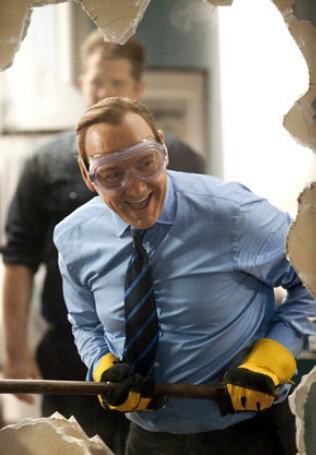
Business Horrible Bosses Truth is nicer than fiction
商業(yè) 惡老板 現(xiàn)實(shí)比電影好得多
A horrible film is generating a lame debate
一部糟糕的電影引發(fā)一場蹩腳的爭論
HORRIBLE bosses come in many flavours.
糟糕的老板會以多種形式出現(xiàn)。
There are psychopaths, bullies and prats.
有精神病患,惡棍還有傻蛋。
Incompetent bosses are irksome, too.
蹩腳老板也令人生厭。
The bosses at New Line Cinema are not incompetent, in that their films make money, but they are still villains.
然而新線影院的老板們并不蹩腳,因?yàn)樗麄兊碾娪澳苜嶅X,但是他們做的還不夠好。
For "Horrible Bosses", their latest offering, is a crime against art and common sense.
因?yàn)樗麄兊淖钚伦髌贰稅豪习濉罚赶铝朔此囆g(shù)和常識之罪。
The viewer is expected to believe that being propositioned by Jennifer Aniston is so traumatic that it would drive a man to plot her murder.
劇組期望中的觀眾會覺得詹妮弗.安妮斯頓的挑逗是如此令人痛苦,以致于他們覺得劇中人物會對她起謀殺之心。
Kevin Spacey (pictured) plays a more convincing psychoboss.
凱文.史派西(如圖)則扮演了一位更加令人信服的變態(tài)老板。
But his talents are wasted on a lame script.
但是他的才能卻浪費(fèi)在不盡如人意的劇本上。
To make matters worse, the film has inspired a torrent of management drivel.
而更糟糕的是,這部影片激起了一陣狂潮,矛頭直指管理層。
OfficeTeam, a recruiter, warns of "Horrible Boss Syndrome", which "can have serious implications" for morale.
一位招聘人員OfficeTeam提醒人們要警惕"惡老板綜合癥"對員工士氣造成的嚴(yán)重影響。
An American survey finds that 46% of employees have worked for an unreasonable boss at some point.
美國的一項(xiàng)調(diào)查發(fā)現(xiàn),46%的雇員都曾在職業(yè)生涯中遇到過不近乎人情的老板。
Nell Minow, a critic, says the film reflects "the bitterness of the post-meltdown era".
批評家Nell Minow表示,該影片反映了"后衰退時代的痛苦"。
All this fuss suggests, not that bosses are growing more horrible, but that employees expect them to be more agreeable.
所有這些小題大做的抱怨表明,老板們并沒有變得更加糟糕,而是員工們希望他們變得更加討人喜歡。
Laws ban discrimination, the internet allows people to air their complaints and the prevailing management culture emphasises sensitivity.
法律禁止歧視,因特網(wǎng)允許人們發(fā)布怨言,而當(dāng)前盛行的管理文化則強(qiáng)調(diào)關(guān)愛體貼。
The monsters of the past knew no such checks.
過去的恐怖老板不懂得這樣對待員工。
John Henry Patterson, who founded the National Cash Register Company in 1884, would set the desks of inept employees on fire.
1884年一手創(chuàng)立美國計算機(jī)服務(wù)公司的John Henry Patterson會放火把無所作為的員工的桌子燒掉。
To find similarly forceful bosses today, one must look East.
今天要想再找出同樣強(qiáng)有力的老板,必須把目光投向東方。
When Zhang Ruimin took over Haier, a Chinese white-goods company, in 1984, he smashed one of the company's products to pieces with a sledgehammer to show what he thought of its quality.
當(dāng)1984年張瑞敏接管中國白色家電公司海爾之時,他用一把大錘子把公司的一件產(chǎn)品砸成碎片,以表明他對公司產(chǎn)品質(zhì)量的看法。
Hollywood could use a few bosses like Mr Zhang.
好萊塢可以用些像張先生這樣的老板。



